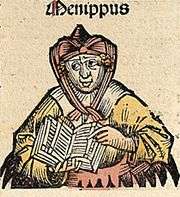Menippus
Menippus of Gadara (/məˈnɪpəs/; Greek: Μένιππος ὁ Γαδαρεύς; fl. 3rd century BC) was a Cynic satirist. His works, all of which are lost, were an important influence on Varro and Lucian. The Menippean satire genre is named after him.


Life
Little is known about the life of Menippus. He was a native of Gadara in Coele-Syria.[1][2][3] The ancient sources agree that he was a slave. He was in the service of a citizen of Pontus, but in some way obtained his freedom and lived at Thebes. Diogenes Laërtius[4] relates a dubious story that he amassed a fortune as a money-lender, lost it, and committed suicide through grief.[5] Lucian ranks Menippus with Antisthenes, Diogenes, and Crates as among the most notable of the Cynics.
Writings
His works (written in a mixture of prose and verse) are all lost. He discussed serious subjects in a spirit of ridicule, and especially delighted in attacking the Epicureans and Stoics. Strabo and Stephanus call him the "earnest-jester" (Greek: σπουδογέλοιος, spoudogeloios). His writings exercised considerable influence upon later literature, and the Menippean satire genre is named after him. Although the writings of Menippus no longer survive, there are some fragments of Varro's Saturae Menippeae, which were written in imitation of Menippus.[6] One of the dialogues attributed to Lucian, his avowed imitator, who frequently mentions him, is called Menippus, but since the sub-title ("The Oracle of the Dead") resembles that of a work ascribed to Menippus by Diogenes Laërtius, it has been suggested that it is imitated from his Necromancy.[7]
Diogenes Laërtius says the following works were written by Menippus:[8]
- Νέκυια – Necromancy
- Διαθῆκαι – Wills
- Ἐπιστολαὶ κεκομψευμέναι ἀπὸ τῶν θεῶν προσώπου – Letters artificially composed as if by the Gods
- Πρὸς τοὺς φυσικοὺς καὶ μαθηματικοὺς καὶ γραμματικοὺς – Replies to the Natural Philosophers, and Mathematicians, and Grammarians
- Γονὰς Ἐπικούρου – The Birth of Epicurus
- Τὰς θρησκευομένας ὑπ' αὐτῶν εἰκάδας – The School's reverence of the twentieth day (celebrated in the Epicurean school)
In addition, Athenaeus mentions works called Symposium[9] and Arcesilaus,[10] and Diogenes Laërtius mentions a Sale of Diogenes (Greek: Διογένους Πράσει)[11] written by Menippus which seems to be the main source of the story that Diogenes of Sinope was captured by pirates and sold into slavery.
Notes
- Blank, David, "Philodemus", The Stanford Encyclopedia of Philosophy (Spring 2019 Edition), Edward N. Zalta (ed.), accessed 3 June 2020.
- Stephanus Byz.; Strabo, xvi.
- Strabo's Geography 16.2.29
- Diogenes Laërtius, vi. 99, 100
- "The tradition that he was a moneylender and speculator in marine insurance is probably apocryphal, resting as it does on the always dubious authority of Hermippus." Donald Dudley, (1937) A History of Cynicism, page 70
- Cicero, Academica, i. 2, 8; Aulus Gellius, ii. 18; Macrobius, Sat. i. 11
- Chisholm, Hugh, ed. (1911). . Encyclopædia Britannica (11th ed.). Cambridge University Press.
- Diogenes Laërtius, vi. 101
- Athenaeus, 14.629F
- Athenaeus, 14.664E
- Diogenes Laërtius, vi. 29.
References

External links
| Wikimedia Commons has media related to Menippus. |
- Lives & Writings on the Cynics, directory of literary references to Ancient Cynics
- Menippus – Lucian's dialogue in which Menippus visits Hades